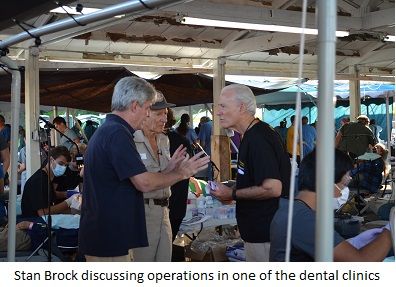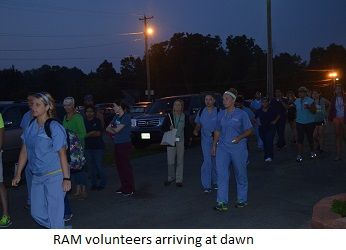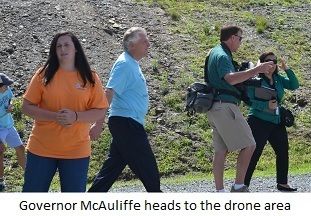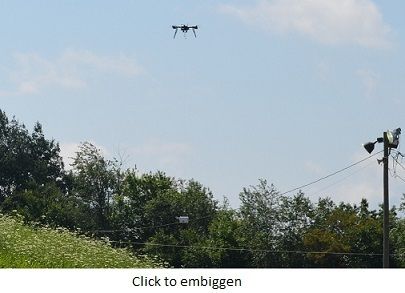 Though the clinic in Wise is Virginia’s anchor, it is only one of four this year; even more in the future if Dr. Vicky Weiss has her way. This weekend’s iteration drew attention for a drone demonstration but the primary purpose remained providing care to persons with limited access to health care.
Though the clinic in Wise is Virginia’s anchor, it is only one of four this year; even more in the future if Dr. Vicky Weiss has her way. This weekend’s iteration drew attention for a drone demonstration but the primary purpose remained providing care to persons with limited access to health care.
The need is underlined by the flood of participants at every event. Here you see the very last open space in the parking area of the Wise County Fair Grounds being filled just as the gates opened yesterday for this weekend’s clinic. The first arrival had been at around 2pm Wednesday, two days before. By 9pm Thursday there were some 800 staged with tickets in hand; at 4:30am Friday over 1,250. By noon the equivalent of about half the population of Wise had passed through the gates for care.
Remote Area Medical (RAM) was initiated by its founder, Stan Brock, to provide service to the world’s inaccessible areas. Upon the realization that barriers to access are not just geographical, he began delivery of care to rural and underserved populations in the United States; eventually into urban centers. Now more than 90% of RAM operations are within the United States.
RAM of Virginia was launched in April 2014 on the steps of the state’s Capitol Building to alleviate the growing need of affordable health care for thousands of underserved Virginians. Headed by Dr. Victoria Molnar Weiss, the affiliate hopes to expand its operations to host many mobile clinics throughout the state yearly.
 This particular clinic has grown to much more than a healthcare event into an expanded care event with exhibitors providing educational sessions on health issues, information about health care coverage (unfortunately without Medicaid expansion this demographic can only hope they can earn their way into affordable care), distribution of clothing and shoes, and more. This broader service may become a facet of other clinics as local support groups become acquainted with RAM.
This particular clinic has grown to much more than a healthcare event into an expanded care event with exhibitors providing educational sessions on health issues, information about health care coverage (unfortunately without Medicaid expansion this demographic can only hope they can earn their way into affordable care), distribution of clothing and shoes, and more. This broader service may become a facet of other clinics as local support groups become acquainted with RAM.
The support requirements for these clinics are staggering. The grounds are provided with portable toilets that require maintenance throughout the weekend which translates into hundreds of rolls of toilet paper and constant attention resulting from accidents and occasional vandalism. There is water and coffee provided during the hours of the clinic. And the volunteers must be fed while they are on duty. If you know anyone in the medical profession, you know that is essential.
Of the 1,200 or so patients that end up sleeping on the grounds overnight, there are some who behave poorly. A volunteer who worked overnight directing traffic and who is a corrections officer at a state prison observed that this year it had been very quiet and that there hadn’t been a problem with alcohol consumption he observed in 2014.
Local law enforcement provided some four officers to patrol the grounds. Formal and informal communities spring up in these close quarters with participants looking out for each other, then dissolving as each person receives service and departs throughout the day. Tents and shelters are established along the tree lines with some forming cul-de-sacs where they share cooking equipment; always a potential fire hazard.
 For the most part, participants are more than willing to assist newcomers with suggestions and information about available care. As the gates open you can hear last bits of advice being shouted through the fence.
For the most part, participants are more than willing to assist newcomers with suggestions and information about available care. As the gates open you can hear last bits of advice being shouted through the fence.
In any population there are members with social and behavioral issues. Some of those manifest at clinics, usually in impatience and sometimes acting out in what comes across as inappropriate frustration.
Here is one of the many disconnects that remains unresolved without the kind of access to care that expanded Medicaid would provide. While a physician at these clinics might recognize symptoms of behavioral issues that require referral, there is no way to link care to local Community Service Boards or even determine where to refer participants who are essentially anonymous. And suggesting that sort of care is required can negatively impact outcomes for other services that are available. Anecdotally, there is generally no upside to addressing these issues in this venue.
In the conversation with the corrections officer, he pointed out that some of the prisoners in the facility where he works, prisoners who are there for life with no hope for parole, began their path to nowhere with the kinds of minor convictions that result from social and behavioral issues he observed overnight. They graduated to more serious criminal behavior while adapting to their environment as they saw necessary to survive in jail and then prison. So that someone who began incarceration as a result of a conviction for a “victimless crime” may end up on death row without ever committing another crime outside the prison walls.
A weekend at RAM can be an education on many levels.
 This clinic also included what amounted to a proof of concept demonstration (Let’s Fly Wisely) for drone-drop technology. Partnering with Flirtey, an Australian drone delivery company, RAM Wise received medications to demonstrate that patients may be better served using this technology. Governor McAuliffe, no stranger to RAM, accompanied by the First Lady of Virginia arrived so that he could be on hand for the first delivery.
This clinic also included what amounted to a proof of concept demonstration (Let’s Fly Wisely) for drone-drop technology. Partnering with Flirtey, an Australian drone delivery company, RAM Wise received medications to demonstrate that patients may be better served using this technology. Governor McAuliffe, no stranger to RAM, accompanied by the First Lady of Virginia arrived so that he could be on hand for the first delivery.
Flirty was established in Sydney in 2013 and is now based in Nevada. It is the world’s first commercial drone delivery service , founded with the vision of revolutionizing four industries: humanitarian, courier delivery, fast food, and online retail. Drones flew from a nearby airport to the clinic where pharmacists received and signed for the prescriptions. Stan Brock contends that the technology could be tremendous not only for RAM but also for relief organizations worldwide.
There are three more clinics scheduled for Virginia in 2015:
Lee County, Sep 12 – 13;
Grundy, Oct 3 – 4; and
Warsaw, Nov 14 – 15
Volunteer opportunities remain available.














